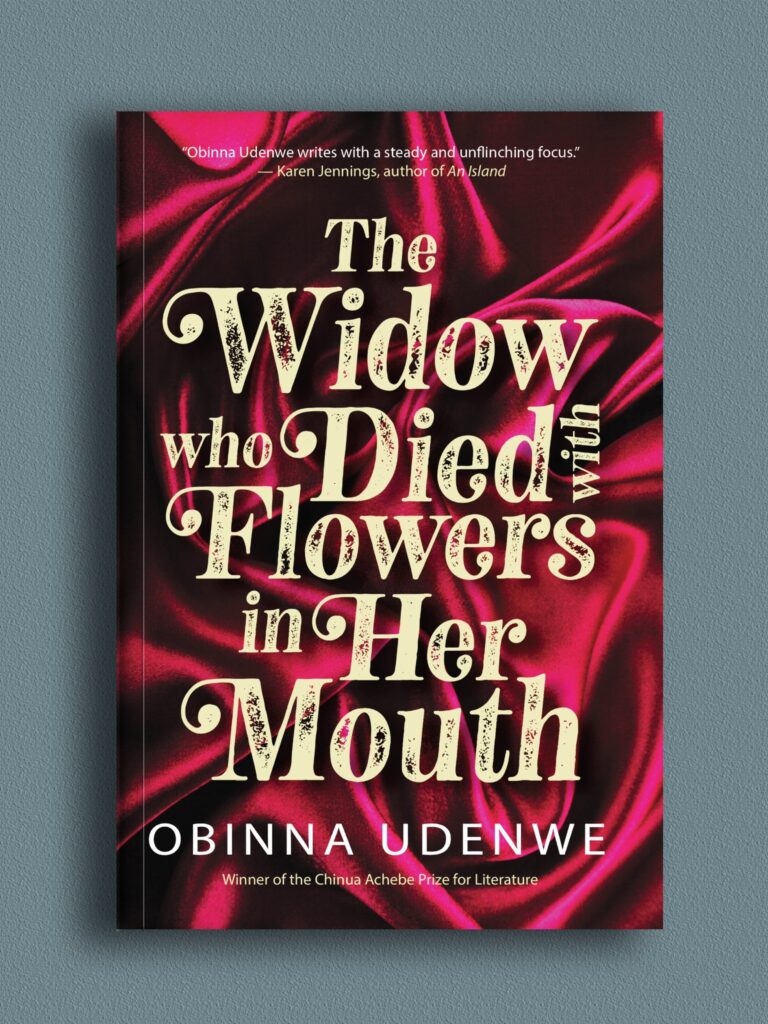There are moments of low form that leave the reader less than satisfied, but when Udenwe does find his stride, he is able to evoke great empathy and pathos…
By Chimezie Chika
For nearly a decade, Obinna Udenwe has been producing books in diverse genres and forms. His 2014 novel, Satans and Shaitans, a thriller a la Dan Brown, with a generous dose of racy plots and conspiracies, follows a number of characters through the intrigue of religion, power, and bloodshed. His 2020 novel, Colours of Hatred, a marked shift from the first, is a literary exploration of how an inevitable decision impacts the life of a family.
Udenwe’s third book, The Widow Who Died with Flowers in Her Mouth, is a story collection that straddles the literary and the plain thrilling. In the eleven stories in the book, we are treated to stories that range over time, style, subject matter and setting. The first two stories in Udenwe’s book are fascinating, poignant tales of people’s search for meaning and relevance in a confusing and unaccountable world.
(Read also: An Unlikely Romance Throbs in the Heart of Cairo in Noor Naga’s If an Egyptian Cannot Speak English)
The first story, “John 101 or The New Ridiculous Way to Commit Suicide and Be Famous,” is a rewarding tale of existential angst. In the story, the main character is a lonely man who decides he has the power to change the world, a decision that has been slow-burning into his consciousness over a long time. The story shows not only one man’s search for relevance but also society’s search for meaning, emancipation and the promise of a messiah in a stifling dispensation.
The second story in the collection, “It Has to do with Emilia,” is another well-considered story of loneliness. With a surrealist conceit at its centre, the story reveals how the desperate search for companionship can sometimes supersede rational thoughts. “Melancholy,” a story set in Anglophone Cameroon (quite a number of stories in Udenwe’s collection are set there), deals with the sadness that overwhelms a female ex-convict. While confronting her daunting present, she reminisces about her past life and actions. This story is also linked to the next story, “The Housekeeper,” in that they feature the same protagonist. Patina, the ex-convict, has now moved to the Nigerian city of Abakaliki where, among other things, she bewitches a lusty plumber in a narrative entrenched firmly in its surreal settings.

“The Redemption of Father McGettrick,” is not only thematically linked to “John 101,” the reader will find that the main character, Father, is a relation of the fatalist John in the first story. They are two of the best stories in the collection, exploring the life and decisions of characters confronted with the existential dilemma of loneliness and the search for meaning. Like “John 101,” “The Redemption of Father McGettrick” begins with a hook: ‘Father Okere believed it was Zadie Smith who made Adaugo, his wife, leave him.’ The stories move naturally without undue inflections or exaggerations, paying attention to how small redemptions or its opposite can be found in ordinary human life. For every conscious artist, the real substance of a story is found in ordinary human life, not in the explication of a supernova event.
Mind you, this is not a collection of linked stories. While some of the stories are linked, others are not. It is clear, though, that Udenwe has a thing for peculiar character names. The first names of some of his characters seem to be a product of Dickensian whimsy. In “The Redemption of Father McGettrick,” there are names like “Father,” and “Young-old Man.” In “The Housekeeper,” there is a character named “Dad.” Acknowledging the limiting nature of the short story form, it gives colour to the characterisation.
There is enough evidence in the collection to believe that Udenwe is an artist coming into his mastery of the short story form, but there is also enough frustrations here to mellow that thought. Some of the stories, despite their great length, are unsatisfying. The title story, “The Widow Who Died with Flowers in Her Mouth,” begins very well but one never shakes off the feeling that this is a missed opportunity. In many of the stories — even if we were to offer the alibi of genre writing — the writer lingers a little too much on the female anatomy. Sometimes it is necessary from a character’s point of view; sometimes it is not. It begins to rankle after a while.
(Read also: With Aiwanose Odafen’s Tomorrow I Become a Woman, the Modern Nigerian Feminist Novel Continues to Mature)
Some of these stories are little more than sensationalist explorations of eroticism. The fixation reaches its most frustrating crescendo in “The Tamarind,” a story whose purpose defeats the imagination. In the morass of its poor prose, one gets to a point where it might be better to head over to Pornhub. There is little nuance and genuine feeling here.

Had Udenwe sustained the superb prose of the first few stories, this would have been one of the unforgettable books of the decade. The author lost his rhythm somewhere along the line. I was displeased with the author’s constant repetition of the phrase “this and that” or some variation of it. It was not a noticeable problem at first, but at some point it becomes that dreadful nervous tick that pockmarks the collection. It is perhaps a manifestation of the creative struggle. The author could have done with less of it.
There are moments of low form that leave the reader less than satisfied, but when Udenwe does find his stride, he is able to evoke great empathy and pathos. In the low moments, the prose teeters and swims in cliché and contrived adrenaline; in the high moments, we see a generous writer able to offer us a deep understanding of the human condition. Udenwe is at his best — such as in the stories, “John 101,” “It Has to do with Emilia,” and “The Redemption of Father McGettrick” — when he explores loneliness and loss, existential dilemma, and the redemption of individuals in societies where they cannot fit in. These are themes that lend themselves well to his powers.
Unlike many may think, the short story, at the level of creation, is a difficult form. Above everything, the writer is constrained by space. Only the best practitioners of the form are able to transcend these limitations. In The Widow Who Died with Flowers in her Mouth, Udenwe achieves an admirable feat of characterisation in some of the stories. There is something for every kind of reader. Udenwe, however, will admit the book’s few promises and glimmers. Readers, too, will finish this collection assured that this author has a lot to say about human life.
Chimezie Chika’s short stories and essays have appeared in, amongst other places, The Question Marker, The Shallow Tales Review, The Lagos Review, Isele Magazine, Brittle Paper, Afrocritik and Aerodrome. He is the fiction editor of Ngiga Review. His interests range from culture to history, art, literature, and the environment. You can find him on Twitter @chimeziechika1.




